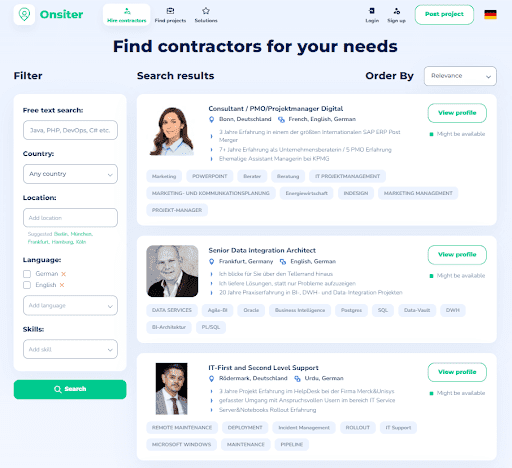VMS vs MSP: What’s the difference and which one should you use for managing contingent workers?
These days, contingent workers are a common component of a company’s workforce strategy. Hiring flexibility, access to specialized skills, a simpler recruitment process, and lower costs are just some of the benefits of hiring contingent labor.
Vendor management systems (VMS) and Managed Service Providers (MSP) make it easier and faster to recruit and manage contingent workers. A VMS is a software system that is used to find and manage independent professionals, whereas an MSP is a service for finding and managing contingent workers.
In this blog post, we discuss the differences between an MSP and VMS and which one you should use for managing your contingent workforce.
Vendor Management System (VMS)
A vendor management system is a cloud-based software system for procuring and managing a contingent workforce. Hiring managers, procurement teams, and human resources use a VMS to find, manage, and share information about a company’s contingent workforce on a central platform.

A VMS supports the entire lifecycle of a contingent worker. Companies use a VMS to find the consultants they need, negotiate contracts, onboard and offboard an independent worker, generate invoices, allow spend tracking, and generate reports so you can measure the effectiveness of your contingent workforce.
Benefits of a vendor management system
A VMS provides numerous benefits for a company that uses a contingent workforce. Some of the common benefits include
- Better overview of the contingent workforce program
- Improves inter-department collaboration
- Greater control of spending
- Increases efficiency through automated processes
- Provides reporting and analytics
- Reduces operational costs
- Ensures compliance
Who should use a vendor management system
Vendor management systems are best for companies and organizations whose teams are hands-on with the recruitment and management of their temporary workers.

Vendor management systems work well for companies that prefer direct contact with a staffing agency or vendors. Some vendor management systems allow users to add their own preferred staffing agencies to the platform, making it easy for future hiring.
In general, a VMS is most effective when there are more applicants than open positions, so it is most suitable for companies and organizations without hard-to-fill positions.
VMS systems allow companies to have smoother processes within their contingent workforce program, remain in control of the recruitment process, and have immediate access to performance metrics that allow them to make better decisions quickly.
Managed Service Providers (MSP)

A managed service provider is an outsourced agency or staffing agency that takes over the responsibility of your external workforce management completely from hiring managers, human resources, and procurement teams.
When you use managed services providers, you are effectively outsourcing the responsibility for your organization’s entire contingent worker program. The MSP will be responsible for setting up the program, interacting with vendors, recruiting quality candidates, contracting, onboarding, offboarding, billing, and taking on the administrative burden in the management of the external workforce.
Other services an MSP can provide include payroll services, candidate marketing, and creating a talent pool for future hiring needs, amongst others.
An MSP provider uses VMS software to manage contingent labor for temporary staffing programs.
Benefits of a managed service provider
A managed service provider provides numerous benefits for its client company. Some of the common benefits include
- Finding high-quality candidates
- Provides screened candidates
- Saves time
- Lowers operations costs
- Builds a talent pool for future hiring needs
- Allows internal teams to focus on core tasks
Who should use a managed service provider
Companies that need to reduce the workload of hiring managers, procurement, and the HR department would benefit from managed service providers.
Meeting external worker staffing goals is not an easy task and requires a lot of focus and legwork. If your company doesn’t have sufficient internal HR resources to recruit candidates for your flexible workforce, engaging with an outsourced provider can prevent recruitment troubles and relieve your internal team from stress.
Companies who are short on staff or need a dedicated team to focus on consultants, temporary staffing needs, and external workforce management would also benefit from MSP services.
Conclusion
Both MSP and VMS solutions offer different benefits and your choice depends on your needs as well as your capacity.
Right People Group and Onsiter provides both MSP and VMS solutions, with a focus on delivering high-quality IT and business consultants in the countries we operate: Denmark, Sweden, Norway, Finland, Germany, Italy, and Spain.
The Onsiter VMS gives you access to more than 10,000 consultant profiles from the Onsiter marketplace as well as access the Vendor Universe, a network of consulting firms across Europe – so that you can find your ideal consultant fast. Additionally, it has the fundamental features for end-to-end management of your external workforce.
If you’re still not sure whether an MSP or VMS is right for your organization, we’re available for a discussion – with no obligations! You can reach us at contact@rightpeoplegroup.com or +44 7441 9080 06.
FAQs about differences between VMS and MSP for managing contingent workers
1. What is the cost difference between implementing a VMS and using an MSP?
The cost of a VMS typically involves subscription fees for the software, while MSP services include the cost of comprehensive management services, which may vary based on the extent of services provided. MSP might be more expensive upfront but can offer cost savings through efficient management and reduced administrative burden.
2. How do MSP and VMS options differ in terms of compliance and risk management?
VMS provides tools to ensure compliance with regulations and contractual obligations through automated processes and documentation. MSPs handle compliance and risk management as part of their service, offering expert guidance and oversight to mitigate risks associated with contingent labor.
3. In terms of industry specialization, how do MSP and VMS services compare?
VMS platforms are generally industry-agnostic, offering tools and functionalities that apply across various sectors. MSPs, on the other hand, often specialize in specific industries, providing deep market knowledge and access to specialized talent pools.
IT contract management
We secure expertise in contract management to optimize your IT agreements, ensure compliance, and deliver maximum value from all your technology investments.
Procurement process optimization
We streamline your operations and reduce costs through strategic procurement and supply chain optimization.
Contract management and compliance
We streamline contract management, helping your business optimize agreements and ensure compliance throughout the entire contract lifecycle.
Contract management
We help companies optimize contract management processes, providing expertise that ensures compliance, mitigates risks, and maximizes the value of your business agreements.
Contract management and compliance
We provide skilled contract specialists who streamline agreement processes, ensuring compliance and optimizing contract management across your organization.
Tender consulting expertise
We deliver expert tender consulting that helps your business secure and manage winning bids with precision and strategic insight.
Need an expert consultant?
Get highly specialized IT and business consultants with deep technical and professional knowledge. We offer flexible solutions for both individual consultants and complete teams.
17+
years experience in the IT- and business consulting industry.
50+
dedicated employees
500+
consultants on assignments
15.000+
pre-screened consultants
Find consultants
Services
About us
Copyright © 2025 Right People Group. All rights reserved.
